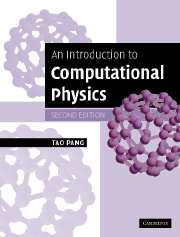Book contents
- Frontmatter
- Contents
- Preface to first edition
- Preface
- Acknowledgments
- 1 Introduction
- 2 Approximation of a function
- 3 Numerical calculus
- 4 Ordinary differential equations
- 5 Numerical methods for matrices
- 6 Spectral analysis
- 7 Partial differential equations
- 8 Molecular dynamics simulations
- 9 Modeling continuous systems
- 10 Monte Carlo simulations
- 11 Genetic algorithm and programming
- 12 Numerical renormalization
- References
- Index
1 - Introduction
Published online by Cambridge University Press: 05 June 2012
- Frontmatter
- Contents
- Preface to first edition
- Preface
- Acknowledgments
- 1 Introduction
- 2 Approximation of a function
- 3 Numerical calculus
- 4 Ordinary differential equations
- 5 Numerical methods for matrices
- 6 Spectral analysis
- 7 Partial differential equations
- 8 Molecular dynamics simulations
- 9 Modeling continuous systems
- 10 Monte Carlo simulations
- 11 Genetic algorithm and programming
- 12 Numerical renormalization
- References
- Index
Summary
Computing has become a necessary means of scientific study. Even in ancient times, the quantification of gained knowledge played an essential role in the further development of mankind. In this chapter, we will discuss the role of computation in advancing scientific knowledge and outline the current status of computational science. We will only provide a quick tour of the subject here. A more detailed discussion on the development of computational science and computers can be found in Moreau (1984) and Nash (1990). Progress in parallel computing and global computing is elucidated in Koniges (2000), Foster and Kesselman (2003), and Abbas (2004).
Computation and science
Modern societies are not the only ones to rely on computation. Ancient societies also had to deal with quantifying their knowledge and events. It is interesting to see how the ancient societies developed their knowledge of numbers and calculations with different means and tools. There is evidence that carved bones and marked rocks were among the early tools used for recording numbers and values and for performing simple estimates more than 20,000 years ago.
The most commonly used number system today is the decimal system, which was in existence in India at least 1500 years ago. It has a radix (base) of 10. A number is represented by a string of figures, with each from the ten available figures (0–9) occupying a different decimal level.
- Type
- Chapter
- Information
- An Introduction to Computational Physics , pp. 1 - 15Publisher: Cambridge University PressPrint publication year: 2006



